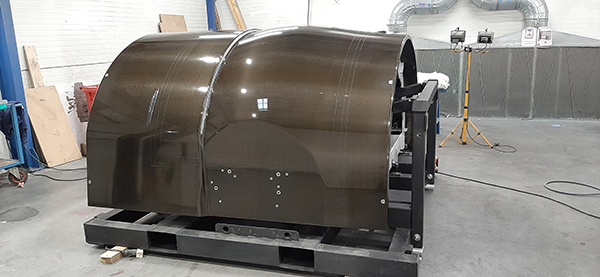“The accuracy of programming is essential for us; if our CNC programs aren’t accurate, it would be catastrophic.” Those are the words of Stéphane Haoui, machining manager at Loiretech, a company specialising in large, complex tools for the commercial aerospace, automotive, defence and energy industries.

Loiretech’s design, manufacturing and production control processes face many issues – which are resolved by seamlessly merging three products – WorkNC, WorkPlan and WorkXplore from Hexagon’s production software portfolio – to create one integrated solution that connects all of its business silos together.
Based at Bouguenais in France, Loiretech Ingénierie produces a range of composite and metal tools for forming, thermoforming, moulding and part inspection. The company designs and manufactures, among other things, moulds for the production of reactors, fuselages and structural parts. In addition, the space market is well catered for, in particular through the production of tools for satellite reflectors and rocket fuselage reflectors. Loiretech supplies the automotive industry with control and automation tools for cutting out entire dashboards.
As well as tooling production, the company directly manufactures blades and propellers for the naval industry. Nine machine tools, which include Zayer, FPT, Forest Liné and Rambaudi, are programmed by Hexagon’s WorkNC CAM software, which Haoui says is vital to its operation: “The shop floor couldn’t function without WorkNC as it’s fully integrated into all stages of manufacturing: analysis, comparison, simulation, verification and machining.”
He says that Loiretech uses materials which can deform on the CNC machines, and their tools must generally be accurate to six or seven hundredths per metre; sometimes even to five hundredths.
“However, WorkNC’s reliability gives us the power and accuracy we need to ensure those tolerances are met every time,” says Haoui. “We begin by creating the WorkNC range, and prepare for manufacturing by extending the surfaces to accommodate the volume and define the part layout.”

After that, the company defines the raw material, the machine to be used, and the work holding. Then, the tool paths are programmed using WorkNC’s roughing, re-roughing, semi-finishing, finishing and cornering functions. The software automatically displays the stock in real time as the workpiece moves forward through the machining process, ensuring high accuracy.
“In order to secure the whole process before starting manufacturing, we simulate the tool paths to check there are no collisions between the machine, the part, the cutting tool and the tool holder,” says Haoui. “And to finalise the part we use WorkNC’s five-axis capability to mark it for routing and drilling. It used to take two days to program a part with 300 holes, but now it takes less than two hours.”
Loiretech Ingénierie also has a research and innovation department working on European aerospace and energy projects which can run over several years, in collaboration with universities and research centres.
WorkPlan keeps track of all the company’s business. As an example, the research and innovations department uses the ERP functionality to have a precise follow-up of costs and correlate them with the budgets allocated by the various financing.
The company installed the software in 2016, and has kept up to date with each new release. Most departments now use it. New functionalities requested, and now available, have been integrated into the company’s workflow, and allow the optimisation of work capacities. This capability means the CMMS module is responsible for managing requests and the follow-up of maintenance interventions within the company. The workshop is also equipped with WorkPlan and has numerous touchscreens for employee management, such as staff input/output, business clocking in/out or incident reporting via CMMS.
IT manager Sébastien Fraquet says: “WorkPlan is the backbone that allows us to structure our services. It can be found at every level of the company. We manage everything with it, from quotation to final invoicing, including purchasing management, non-conformity management and personnel management.”

By using all the modules, different departments can know the costs being generated and react quickly to preserve and increase the company’s profitability.
“Thanks to the real-time stock availability and the calculation of net requirements, the orders placed are extremely accurate,” says Fraquet. “Another important feature, the ‘Order Status’ module, is essential for determining that the production work in progress is sent quarterly to administrative and financial management. We need to know how much we’re getting back for everything we have on the shop floor, both in terms of hours spent on the job, and volume of purchases. This allows us to know the value of the company.”
The software permits Loiretech to issue constant balance sheets and develop new business using existing information in its database.
“We can use old estimates as a knowledge base, and adapt them to make similar projects profitable, time after time,” says Fraquet.
The third Hexagon solution contributing to Loiretech Ingénierie’s Industry 4.0 philosophy, is the high-speed CAD viewer, WorkXplore, which allows the company to open all types and sizes of CAD files in use, and import and analyse them at high speed.
“The sales and projects departments open CATIA and other CAD files with WorkXplore in order to analyse and cost projects. In addition, the workshop uses it for assembly and measurements. Some vital information isn’t visible on 2D plans, but thanks to the workshop having the full 3D file, we avoid additional costs caused by assembly non-conformities. The subcontracting department also uses WorkXplore as some parts of their tooling are machined elsewhere – they send 3D files by email, add annotations to the files and make quick dimensional drawings to ensure the subcontractor has all the necessary information.”
Loiretech’s use of three Hexagon products to integrate its former individual business silos is a good example of how the Industry 4.0 philosophy creates data-driven smart factories, giving a new level of insight and solutions which improve efficiency and quality, while reducing costs.
For further information www.worknc.com














